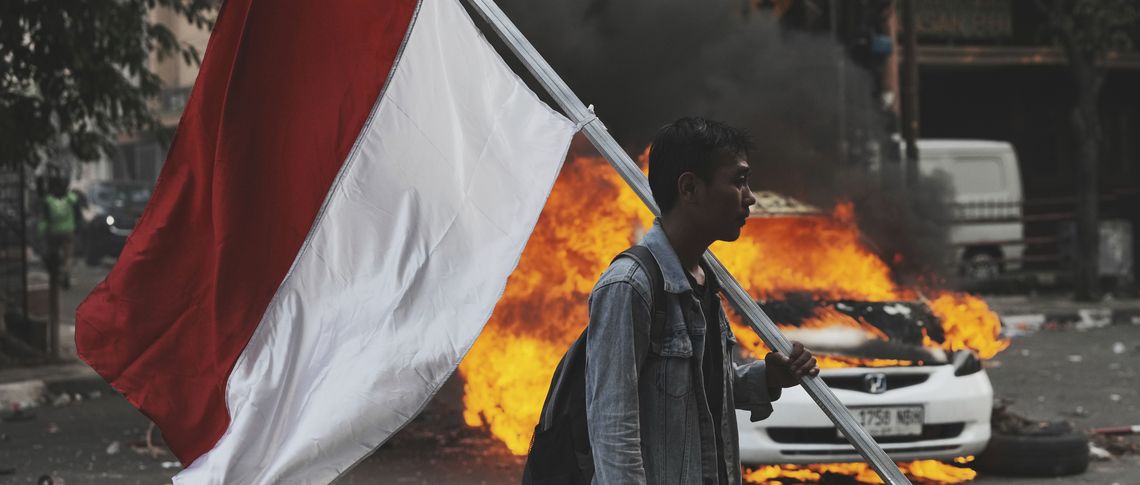Starting on 25 August 2025, a number of Indonesian cities such as Jakarta, Surabaya, Bandung, Yogyakarta, Pontianak and Makassar saw mass protests that lasted several days. These were triggered by an announcement that parliamentarian allowances would be increased, in particular certain bonuses that would amount to several times the legal minimum wage. When the motorbike rider Affan Kurniawan was run over and killed by a police vehicle on 28 August, the protests escalated. Participants included primarily school and university students, but also workers and many employees in the informal sector. Frustrations that had been building up over several months were released in days of rioting that shocked even the political elite in Jakarta.
A vague feeling of anger and disillusionment had driven the protest movement onto the street. Following plant closures in industries such as textiles, thousands of Indonesians have lost their jobs this year. Hundreds of thousands of gig workers are in precarious employment. Following budgetary cuts, school and university students are fearing for their professional futures. Increases in the cost of living and taxes are adding to the unease. The police reacted vigorously to the demonstrations, arresting more than 3 300 people, while over 1 000 were injured and 10 died.
It was particularly noticeable that, during the riots, looters were able to access the houses of several parliamentarians, as well as that of the (now former) finance minister Sri Mulyani, with barely any resistance from security forces. In some cases, targeted arson attacks are said to have been executed with marked professionalism. Rumours and conspiracy theories relating to alleged backers of the protests continue to circulate, not to mention speculation about mysterious foreign powers. More common, however, are discussions about the specific interests of the police and the military, also regarding the rivalry between President Prabowo Subianto and his predecessor Joko ‘Jokowi’ Widodo. Regardless of these partly sensationalist speculations, the fact remains that the protests originate from widespread outrage at the misuse of power and luxurious lifestyle of an elite oligarchy composed of businesspeople, bureaucrats, politicians, as well as the leadership of both the police and the army.
In Indonesia, a curious contrast prevails between a parliament that sees hardly any debates and lacks a clear division between government and opposition, and an active political culture in daily life where every topic imaginable is debated.
Prabowo and the chief of police have promised to provide quick answers regarding the death of Affan Kurniawan. The president also announced reductions in parliamentary allowances. Some politicians, including the speaker of the parliament, apologised and promised improvements. In early September, representatives of the protest movement presented parliament with a list of 17 short-term and eight long-term demands. Requests addressed directly to the president include the withdrawal of the military from civilian areas, the non-criminalisation of protestors and an inquiry into the deaths of Kurniawan and other victims of state violence. The national parliament is to freeze bonuses that supplement parliamentary allowances, investigate the problematic behaviour of individual parliamentarians and deploy the anti-corruption agency if required. The police are requested to release all arrested protestors, adhere to standard de-escalation procedures in the future and punish human rights violations.
The protests are directed against the government of Prabowo and the cartel of parties supporting it. Prabowo was elected president of Indonesia in February 2024 and took office in October. Already during the Suharto dictatorship, the so-called New Order (1966-98), he had climbed the ranks to become one of the most powerful generals. Prabowo, at the time Suharto’s son-in-law, was notorious as the head of the special forces. Human rights activists held him responsible for crimes, for example in East Timor, which was occupied at the time by Indonesia, or in relation to the abduction and alleged murder of student activists in 1998. In the same year, Prabowo was dismissed in disgrace from the military and went into exile in Jordan for several years, from where he plotted his political rise in Indonesia.
In 2014 and 2019, he was defeated by Jokowi in severely divisive presidential campaigns, in which Prabowo positioned himself as a right-wing populist and did not reject the support of Islamist forces. All the more surprising was his U-turn following the 2019 elections, when he accepted Jokowi’s offer to join his cabinet as defence secretary. In the 2023/2024 election campaign, Jokowi even supported Prabowo and managed to position his son Gibran as Prabowo’s running mate — with the active assistance of a constitutional court that lowered the age limit for vice presidential candidates at the last minute.
Between parliament and daily life
Eight parties are currently represented in parliament — without, however, any genuine opposition. Megawati Sukarnoputri – the chairperson of the Indonesian Democratic Party of Struggle (PDI-P) that holds the highest number of members in the national parliament – even declared that the presidential system fundamentally does not cater for any opposition. Such opinions are in line with Prabowo’s concept of democracy, which targets a Demokrasi santun, or ‘polite democracy’, and is based on an allegedly ancient Indonesian, amicable and ultimately paternalistic decision-making culture.
In Indonesia, a curious contrast prevails between a parliament that sees hardly any debates and lacks a clear division between government and opposition, and an active political culture in daily life where every topic imaginable is debated — in social media but also in countless TV talk shows. The political class isolates itself from the outside world. Only occasionally does the tone become more heated in direct – and particularly presidential – elections. As in 2014 and 2019, debates among politicians and also in civil society can, at least for a few weeks, become extremely divisive, fuelled by Islamists and right-wing populists. Public debate is often determined by fake news and paid influencers, with armies of trolls also stirring things up. Together with agents provocateurs and plain-clothed police and military, they can instigate protests or provoke escalations, a regular occurrence in the past.
Prabowo is targeting a limited democracy led by himself in his role as a strongman, in which politics and government are based on military behavioural patterns.
After barely a year in office, Prabowo’s government is associated with an expansion of military powers into civilian life, reminding critics of the notorious dual function (dwifungsi) in Suharto’s New Order. The dwifungsi doctrine had once legitimised the military dictatorship and the ubiquity of security forces, so that the military could assume both political and security-related tasks at the same time. Prabowo now appears to want to reinstate the New Order, at least in part. The attempt to rewrite Indonesia’s most recent history under the auspices of a commission appears to support this. Prabowo is targeting a limited democracy led by himself in his role as a strongman, in which politics and government are based on military behavioural patterns.
A private sector with weak unions and limited environmental and socio-political conditions is set to be complemented by a state capitalist sector promoting prestige projects. An example is the controversial programme to provide school children, breastfeeding women and pregnant mothers with a free meal. With its aim of reaching 83 million people in the future, it is both extremely expensive and insufficiently targeted. In addition, Prabowo wishes to create cooperatives in more than 80 000 Indonesian villages. All of these programmes are a burden to the national budget. In many areas, this has led to huge reductions in funding, with the exception of the defence budget which has increased significantly. Moreover, a sovereign wealth fund, Danantara, has been created, which is expected to manage assets worth $900 billion. It is to be assumed that the projects, together with the huge sovereign wealth fund, are clearly designed to serve Prabowo’s patronage machine.
Overall, the retreat of electoral democracy, first identified in the 2010s, continues to accelerate. The scope of civil society has been limited for many years, for example by the Electronic Information and Transactions Law. In 2026, a new criminal law will come into force. This year, parliament revised the Armed Forces Act. Modifications of the Police Act and the Criminal Procedure Law are set to follow. Together they could strengthen the position of the security forces and Prabowo. Political observers fear, however, that he may at some point be able to use his extraordinary power to declare martial law and introduce a new phase of autocracy.






